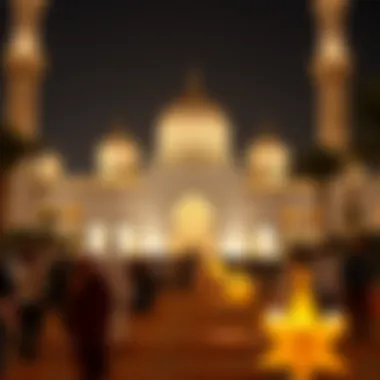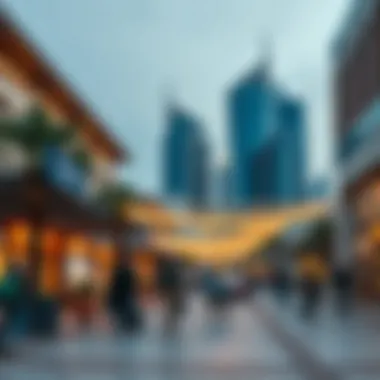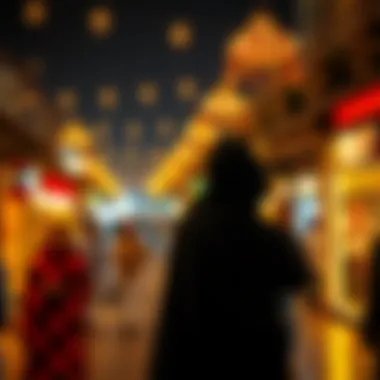2024 UAE Holidays Calendar: A Detailed Overview


Intro
The United Arab Emirates is a tapestry woven with culture, tradition, and vibrancy. Each year, the nation celebrates an array of public and religious holidays that not only honor its heritage but also shape various elemental sectors of life, including real estate and tourism. Understanding the nuances of these holidays is paramount for investors and stakeholders within the UAE market, particularly in the bustling city of Dubai. In 2024, the UAE holidays provide significant touchpoints for societal engagement and investment opportunities.
Navigating through the holidays, one can appreciate how each occasion influences everyday life and business practices. From the lively celebrations of Eid to the solemn observance of National Day, each event carries its weight in significance, impacting people's choices and opportunities.
In the following sections, we will dissect the implications of these holidays on market trends and investment avenues, ensuring that readers are well-equipped to make informed decisions. Each holiday warrants a closer look, allowing for tailored insights into how these dates can be pivotal for property investments and lifestyle choices in the UAE.
The conversation around the UAE holidays isn’t confined to their significance alone; rather, it extends into analyzing trends and future predictions that stem from these events. In our exploration, expect to discover actionable insights geared towards navigating the investment landscape, taking into account the cultural essence underpinning each celebration.
By the end of this examination, one should not only comprehend the calendar of holidays for 2024 but also grasp the broader socio-economic impacts these occasions bear on the real estate market. Join this deep-dive as we uncover not just what the holidays are, but how they echo through the fabric of life in the UAE.
Prolusion to UAE Holidays
Holidays in the UAE are more than just days off from work; they're part of the cultural fabric that binds communities together. Understanding these holidays offers a peek into the traditions and values upheld by the diverse populace of the United Arab Emirates. Each holiday, whether public or religious, carries distinct significance and is celebrated with unique customs. This article serves as a guiding light through the calendar of 2024, shedding light on the public holidays celebrated in the country, their cultural importance, and their impact on various sectors, especially real estate and tourism. Grasping this information can be instrumental for those engaged in investment and development in the region, as it lays bare the socio-economic landscape shaped by these celebrations.
Overview of Public Holidays
The UAE government recognizes several public holidays, which can be grouped into official government holidays and religious observances. These holidays typically include significant occasions such as New Year's Day, Labour Day, and the two Eid celebrations, and they provide residents and expatriates alike with a chance to participate in festivities that highlight their heritage.
Public holidays in the UAE are often days of cultural unity, marked by celebrations, family gatherings, and community activities. The exact dates of religious holidays shift annually, according to the Islamic lunar calendar, which adds an element of flexibility and anticipation to how citizens and expatriates plan their annual activities.
Some notable public holidays are:
- New Year’s Day – A day that ushers in the new year, setting a tone of aspiration and renewal.
- Eid Al-Fitr – Marking the end of Ramadan, this holiday is a time of feast and family, reflecting joy and gratitude.
- National Day – Celebrated on December 2, this day commemorates the country’s unification and sovereignty.
Each holiday comes with its own set of traditions, often involving special meals, public festivities, and sporting events that not only encourage community spirit but also invite tourism and local business engagement.
Importance of Holidays in UAE Culture
Holidays in the UAE serve as a backbone for cultural expression and social bonding. They provide a platform for individuals and families to connect, fostering a sense of belonging and communal identity. During these periods, people often engage not just in celebration, but also in reflection about values, histories, and social responsibilities.
Furthermore, holidays encourage participation in cultural traditions that might have been passed down through generations. For instance, during Eid, it is common for families to visit mosques, give to charity, and enjoy traditional meals together. This reflects the Islamic teachings of community and generosity.
On a larger scale, holidays also impact the economy. Businesses often see surges in activity during festive periods, with a notable increase in consumer spending on hospitality and tourism. Investors in the real estate sector, for instance, should pay close attention to how these holidays affect market trends, as many expatriates and tourists visit during these periods, influencing property demand and rental rates.
"Understanding the intricate relationship between holidays and cultural practices is key for anyone looking to operate or invest in the UAE market."
Public Holidays in
Public holidays in the UAE serve as milestones in the yearly calendar that foster a sense of community and cultural identity among residents. They provide a unique glimpse into the local culture, blending long-held traditions with modern practices. This section not only outlines the various public holidays observed in 2024 but also delves into their significance, cultural practices, and their influence on different sectors such as tourism and real estate, especially for investors keen on understanding these dynamics.


New Year's Day
New Year's Day marks the beginning of the year and is celebrated on January 1. It's a day filled with optimism and resolutions, although it also presents practical implications. Businesses generally close for the day, giving employees a chance to recharge after holiday festivities. This observance often attracts tourists and locals alike, contributing to economic activity in the hospitality sector.
Labour Day
Labour Day falls on May 1, recognizing the contributions of the workforce to the nation's development. It's a day that serves as a reminder of workers' rights and the importance of fair labor practices. Companies may host events or offer special promotions to acknowledge their employees, thereby boosting morale and productivity. For the real estate sector, it can also mean a slowdown in construction activities, affecting timelines for project completions.
Eid Al-Fitr
Definition and Significance
Eid Al-Fitr, which translates to "Festival of Breaking the Fast," is celebrated after the holy month of Ramadan. It signifies the end of fasting and is a time for reflection, family, and community. The significance of this festival runs deep in Islamic tradition, promoting values like charity and camaraderie.
The festival also serves to strengthen social bonds, as families gather to celebrate and share meals, fostering a sense of unity. This holiday has a positive impact on the hospitality and retail sectors, where the demand for products and services spikes as people prepare for celebrations.
Cultural Practices
Cultural practices during Eid Al-Fitr vary but are generally centered around communication and generosity. Common practices include giving Zakat al-Fitr, a form of charity, which helps those in need share in the festive spirit. Additionally, the food served during this holiday often features traditional dishes, enhancing community connections through shared culinary experiences. Investors and business owners could see a surge in activity as people shop for new clothes and gifts leading up to the holiday.
Arafat Day
Arafat Day is observed during the Hajj pilgrimage, marking a critical point for Muslims to seek forgiveness and salvation. It's a deeply spiritual day filled with prayers and reflection. This holiday often precedes Eid Al-Adha and serves as a reminder of faith and the importance of community in Islamic teachings.
Eid Al-Adha
Timing and Traditions
Eid Al-Adha falls about 70 days after Eid Al-Fitr and coincides with the Hajj pilgrimage. This festival commemorates the willingness of Ibrahim (Abraham) to sacrifice his son as an act of obedience to God. Families traditionally sacrifice an animal, and share the meat with the less fortunate, emphasizing community and compassion.
The timing of Eid Al-Adha is crucial as it can vary depending on moon sightings, which can affect travel plans for expatriates or tourists wishing to experience the festivities. For real estate, it often means a surge in hospitality bookings as families gather for feasts.
Impact on Real Estate and Travel
Eid Al-Adha significantly influences the real estate and travel sectors due to increased movement of people. Many choose to travel either domestically or abroad, prompting a spike in demand for accommodations and short-term rentals.
The market often sees an uptick in real estate transactions, as families may wish to purchase new homes in time for these celebrations. For investors, understanding these patterns can be pivotal when exploring new opportunities.
Islamic New Year
The Islamic New Year, known as Hijri New Year, marks the beginning of the Islamic lunar calendar. While it is not celebrated with as much fanfare as other holidays, it is still a significant time for reflection and renewal. The day is often marked with personal contemplation and prayers.
Prophet Muhammad's Birthday


Celebrated on the 12th day of the month of Rabi' al-awwal, this day recognizes the birth of the Prophet Muhammad. It serves as an occasion for Muslims to gather in appreciation of Islamic teachings and the importance of following the Prophet's example.
Commemoration Day
Commemoration Day is observed on November 30, honoring Emirati martyrs who have sacrificed their lives for the country. This day serves as a poignant reminder of national pride, underlining the significance of duty and honor within the UAE, while fostering a sense of unity and remembrance among its citizens.
National Day
Celebrations and Events
National Day, celebrated on December 2, marks the occasion when the United Arab Emirates was formed in 1971. Typically, the day is festooned with various events, parades, and fireworks. The celebrations often reflect the deep-rooted pride Emiratis feel for their nation, showcasing traditional dances, music, and food.
These festivities are significant not only on a cultural level but also economically; they tend to boost local businesses as families and tourists engage in celebrations and gatherings.
Impact on the Property Market
National Day has noticeable consequences for the property market. Many residents may seek to invest in real estate or upgrade their homes during this time. Additionally, the influx of tourists can lead to increased demand for rental properties, which may positively affect prices and market dynamics.
Understanding these holidays provides valuable insights into the UAE's cultural framework and its impact on various sectors, particularly for those interested in the investments and real estate sphere.
Cultural and Social Aspects of Holidays
Celebrations in the UAE are more than just days off work; they are a rich tapestry woven with threads of tradition, family, and spirituality. In the context of the UAE, understanding the cultural and social aspects of holidays sheds light on how these observances shape community ties and contribute to the very fabric of life in this vibrant nation. For investors and visitors alike, grasping these elements provides a more profound appreciation of what makes the UAE unique, influencing social dynamics and economic opportunities alike.
Family Traditions and Gatherings
Family stands at the heart of UAE holidays. When New Year's Day rolls around, or during the festivities of Eid Al-Fitr, families often come together not just to mark the occasion but to renew bonds that might have frayed in the hustle of daily life. It’s common to see families gathering in sprawling villas, enjoying meals that span several generations of recipes.
Each holiday brings a specific set of traditions, whether it’s a barbecue on National Day or the exchange of sweets during Eid. Numerous families will often prepare dishes that are unique to their lineage. For example, one might encounter a traditional dish called Al Harees during Ramadan, a blend of wheat and meat that takes hours to cook with care and attention. These gatherings are intimate affairs, filled with laughter, storytelling, and vibrant exchanges filled with love and nostalgia.
Festivities in Different Emirates
With each emirate sporting its own flair, holiday celebrations can vary widely across the UAE. For instance, Dubai is famous for its extravagant firework displays on New Year’s Eve, lighting up the Burj Khalifa and attracting visitors from around the globe. In contrast, the quieter northern emirates like Ajman may focus on community gatherings that emphasize local culture and traditions.
Abu Dhabi often hosts large-scale events during National Day that highlight the rich heritage of the Emirati people. You would witness traditional dances like the Al Ayala, performed by men in a circle, the rhythmic beating of drums echoing the unity and pride of the nation. Each emirate tailors its celebrations to reflect local customs, making the experience of the holidays multi-faceted and enriching.
Culinary Highlights
Food plays a pivotal role in any celebration, with UAE holidays serving as a showcase of culinary diversity. For instance, during Eid Al-Adha, families prepare lavish feasts that often include lamb and various traditional sweets. One can't ignore the famous Baklava, a sweet pastry that has become synonymous with celebrations, showcasing layers of flavors and textures that delight the palate.
The Ramadan Iftar meal is another highlight, filled with dates, lentil soup, and various grilled meats, emphasizing both sharing and gratitude. The streets come alive as food stalls spring up, offering everything from Shawarma to Falafel, creating a festive atmosphere that embraces the community.
"Celebrating together, sharing culinary delights, and embracing traditions binds us closer as a society."


For more insights on UAE traditions and life, check out UAE Culture Overview and Culinary Traditions of UAE.
Holidays and the Real Estate Market
Holidays in the UAE, renowned for their cultural vibrance, also wield a notable influence on the real estate market. The interconnectedness between public holidays and housing demand deserves a closer examination. During holiday periods, many residents and tourists alike flock to popular destinations, leading to spikes in short-term rentals and property buying behaviors. Notably, the festive atmosphere often enhances the visibility of certain neighborhoods, particularly those laden with cultural significance or tourist magnetism.
The structure of property demand, influenced by various festive occasions, can be understood through several key points:
- Increased Short-Term Rental Demand: Holidays often see a surge in tourists looking for accommodation. This results in higher revenue for property owners and can encourage more investments in short-term rental properties.
- Family Engagement and Relocation Decisions: Many families use holiday periods to evaluate their living situations, making decisions about moving or investing in better homes.
- Cultural and Emotional Factors: The festive spirit can motivate buyers to make impulsive purchases. This is often seen during Eid or National Day when the emotional value of investing in a property can be heightened.
It’s clear that while holidays might seem like mere time off for relaxation and celebration, they actually present significant economic opportunities within the real estate sector. Investors and property managers must remain acutely aware of these trends to capitalize on them effectively.
Effect on Property Demand
The impact of holidays on property demand is particularly potent in the UAE, where diverse cultures come together in celebration. For instance, during Eid holidays, you might identify trends that suggest a temporary boost in sales as families look to upsize or make a robust investment. This correlation often sees potential buyers flock to the market for various reasons, including:
- Increased Purchasing Power: Double bonuses and gifts during this period often mean more liquidity, resulting in higher interest in property acquisition.
- Traditional Gatherings: Many choose to invest in larger homes to accommodate family gatherings, indicating a direct link between holiday practices and property size preferences.
- Market Perceptions: Potential buyers may perceive a sense of urgency due to the holiday discounts often offered. This momentum can inflate demand temporarily, leading to quicker sales cycles.
Investors should watch these fluctuations carefully, as the right timing aligned with holiday calendars can be a golden ticket for closing deals.
Tourism and Investment Opportunities
From an investment standpoint, understanding how holidays influence tourism is key. Observers often note that periods surrounding major holidays witness a significant increase in flight bookings and hotel stays, consequently boosting the appeal of real estate investments in those areas.
The remarkable growth of the tourism industry during festive occasions such as New Year's Eve and Eid can’t be overlooked. Some notable factors include:
- Spike in Rental Prices: Tourist influx often results in higher prices for rental accommodations, which is attractive for investors seeking consistent returns.
- Commercial Opportunities for Homeowners: Many homeowners might choose to rent out their properties during peak holiday seasons, effectively generating additional income. This creates a specific niche market that can be very lucrative.
- Emerging Investment Hotspots: Observing tourism trends can reveal emerging neighborhoods that are on the verge of becoming investment hotspots, further indicating where to direct financial interests.
In summary, both the holidays and their resultant economic activities create a lot of opportunities for savvy investors in the UAE's real estate market. Recognizing these patterns can allow for strategic investments aligned not just with current trends, but also with cultural fluctuations.
Culmination
Reflecting on the UAE holidays for 2024, one can’t overlook the profound impact these occasions have on various facets of life in the Emirates. This article meticulously examines significant public and cultural holidays, offering readers a thorough understanding of how these days shape both individual lives and broad societal functions.
Wrap-Up of Key Holidays
In essence, each holiday featured has its nuances and significance.
- New Year's Day signifies renewal and fresh beginnings, a time for family and friendship.
- Eid Al-Fitr marks the end of Ramadan. Muslim families come together to celebrate with meals, prayers, and giving.
- National Day portrays patriotism, packed with parades and fireworks, reinforcing unity among the UAE residents.
"Every holiday not only brings joy but serves as a reminder of the heritage, values, and traditions that underscore the identity of the UAE."
These days also spotlight how holidays intertwine with local businesses. For instance, during Eid Al-Adha, the demand for real estate and accommodation quickens as families travel or host relatives. Similarly, events like Labour Day accentuate the role of workers, a day of respect and appreciation which resonates in the real estate sector as well.
Final Thoughts on Cultural Significance
Embracing these holidays is far more than observing customs; it’s about weaving a rich tapestry of collective experiences that bind communities. Cultural significance goes beyond mere celebration; it embraces reflection on identity, unity, and respect among the diverse populations of the UAE.
Investors and those in the real estate markets need to grasp these dynamics well. Connecting emotionally with the cultural backdrop of the UAE not only shapes business strategies but also strengthens community ties.



